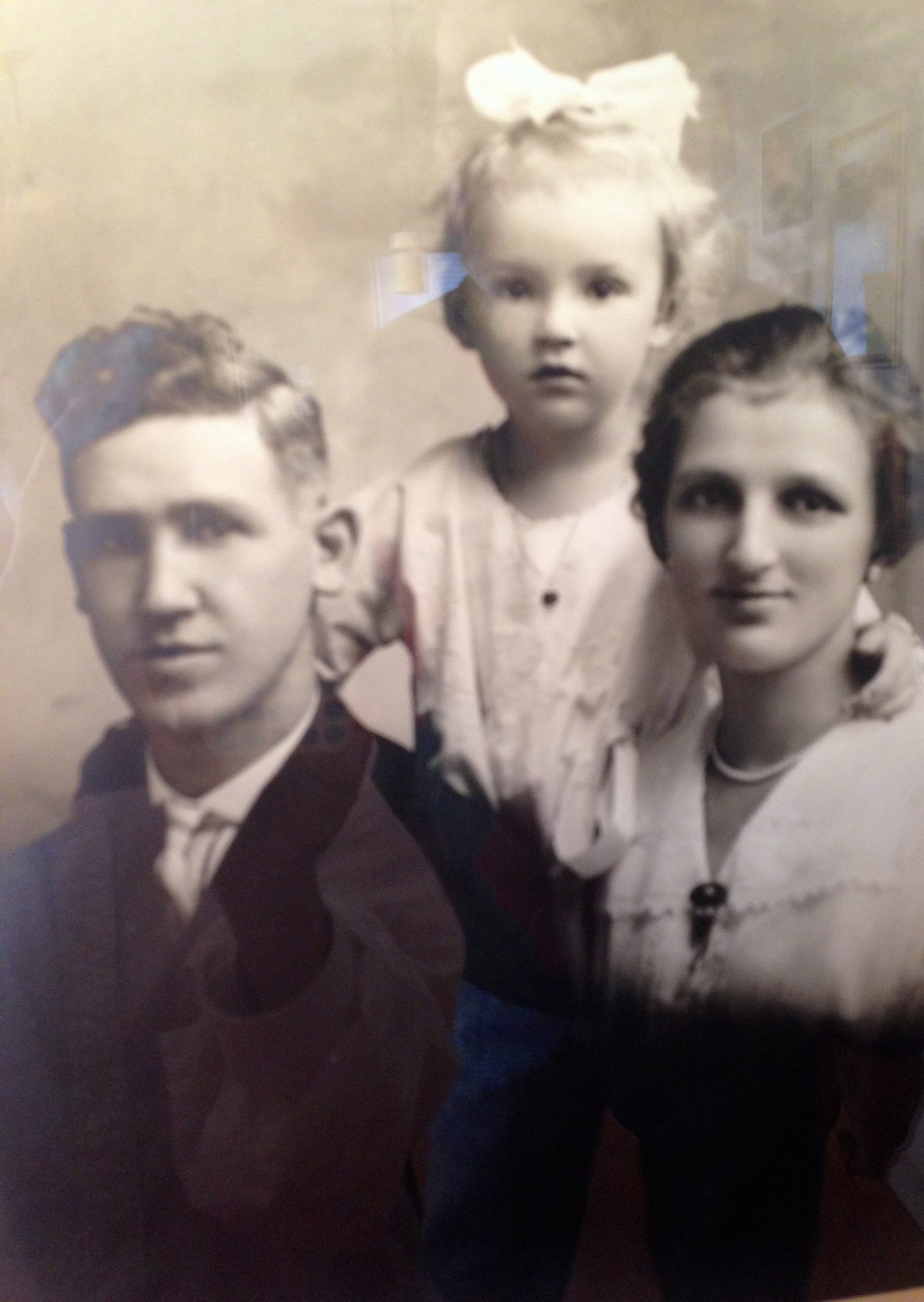Lent Three: Loving Leonard

My mother-in-law always grieved Leonard, her tall and handsome father. She was three when he died; he was twenty-eight. He was a millworker in the woolen mills of Lawrence: young and healthy one week and gone the next. Family history says that he went into Massachusetts General Hospital in Boston in 1918, thirty long miles away, and “didn’t come out.” Best sense as to cause of death: a burst appendix, then peritonitis.
His picture, along with his wife and only child, hangs in our dining room today. She is barely more than a toddler, standing behind her parents, hands on their shoulders. Several months later, he died. Years after, she named her only son Leonard.
We remember him because she remembered. And because he died in the faith, as did she, I trust that father and daughter are together now; that despair has turned to joy.
Despair to joy. It’s the same way with stories of suffering throughout the Bible, especially those about women who face unimaginable tragedy. After studying women’s stories in the Bible for ten years, there are those whose pain continues to haunt me; I cannot forget about them. Thankfully, neither does the Bible.
I am grateful that scripture is not shy about sharing stories of incest, rape, murder, and violence against women—because it happens. It happened then and it happens now. We are lesser people if we ignore our own history, and so many of us do.
In this season of Lent, I offer three of the most troubling stories of pain and suffering experienced by women of the Bible. Doing so helps me let go of them and puts them back in scripture…for they ARE part of a bigger picture; they are loved by the One who will hold them throughout eternity; their suffering has been resolved; and they will always be remembered because of their place in our sacred canon.
Three stories in particular rise up:
1) Last week, I wrote here about the wife in Judges 19 who was thrown out of her guest house to be gang-raped. She was then cut into pieces by her husband, who sent her remains through Israel as a message that his “property” had been violated by the Benjamites, a brother tribe in Israel. However tragic her story was, it does not end with her death:
The other eleven Israelite tribes avenged her murder by killing some 25,000 Benjamites, including women and children—so many that there were not enough women for the 600 surviving Benjamite men to marry.
Because they have vowed not to let their daughters marry Benjamite men, the warriors attacked the town of Jabesh-Gilead, and stole away 400 maidens. Alas, it was not enough; 200 more maidens are needed, one for each man. The men of Israel then abduct 200 more young girls for sexual slavery on the day they find them dancing in celebration of spring. Sometimes we make the mistake of thinking that it is only other cultures that engage in gang rape and kidnapping, but it is clearly in our Judeo/Christian past as well.
2) In Judges, we also find the story of Jepthath’s daughter. Deep in battle, her father makes a bargain with God: should God help him defeat the Ammonites, he will sacrifice the first living thing that runs outside upon his return home. Chances are he was expecting a goat or lamb to appear. Unfortunately, his beautiful young daughter runs out to greet him. When she realizes the awful bargain her father as struck with God, she is horrified. But all she asks is for two months in the mountains, with her girlfriends, to mourn the knowledge that she will never grow old enough to bear children. The Bible says that, “[Jephthath] did with her according to the vow he had made.” Tragically, she lost her life for an ill-conceived bargain.
3) Finally, hidden in the pages of 2 Kings is the rather shocking story of the woman who ate her son. We could forget about it. We could say it is a crazy tale of war. It is that and more: it is a demonstration of what horrible things war does to people, especially mothers. Taking place in Samaria, King Ben-hadad is walking along the wall of the city following a battle. Desolation rears up on every side. He hears a woman crying. One would think she would be crying for her son–and she is, partly. But she is also bewailing a bargain made with another woman–that they would cook their sons on successive days and eat them so they might survive. The crying woman kept her part of the bargain. The other woman fled; the first woman feels cheated. Mental illness; violence birthed in war, disunity, chilling tales of what war does to humankind–it’s all there.
Scripture remembers. God remembers. And in this season of Lent, while looking at these incredibly sad stories, I am reminded of Jesus’s action AFTER he fed the 5000: he made sure that all the leftover, crumbled, seemingly discarded pieces of bread were collected. He didn’t leave them on the ground, overlooked; he had his disciples pick them up, put them in baskets and bring them to him. “Gather up the fragments left over,” Jesus said, “so that nothing may be lost.” (John 6:12)
Likewise, God lifts up those parts of ourselves that have been broken and traumatized. God uses all we have been through and all of who we are for good. Nothing is lost; nothing is forgotten; all is redeemed. We are loved. As we march through Lent, may we keep our eyes and hearts fixed on the one thing we know: that the darknest night is indeed no contest for the brightest Light of all.

